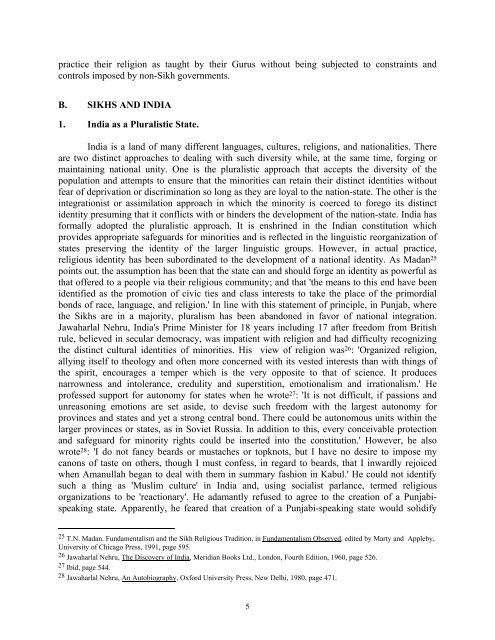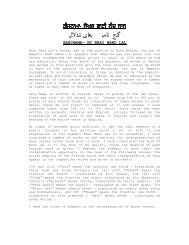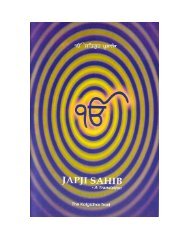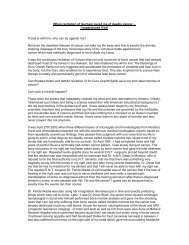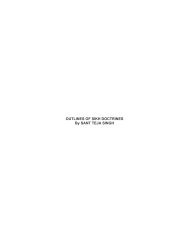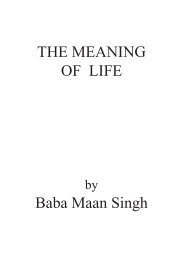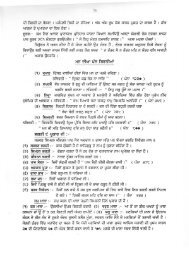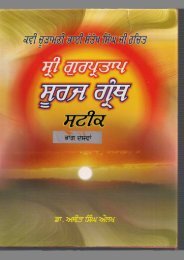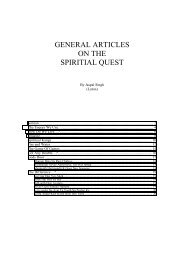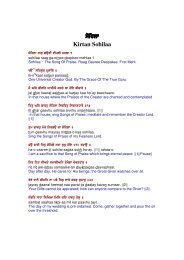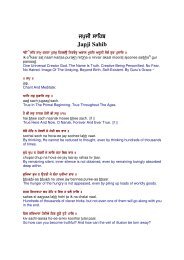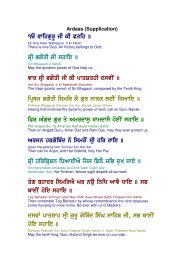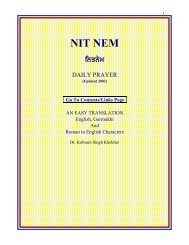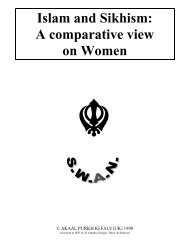Sant Jarnail Singh Bhindranwale - Sikh Missionary Society (UK)
Sant Jarnail Singh Bhindranwale - Sikh Missionary Society (UK)
Sant Jarnail Singh Bhindranwale - Sikh Missionary Society (UK)
Create successful ePaper yourself
Turn your PDF publications into a flip-book with our unique Google optimized e-Paper software.
practice their religion as taught by their Gurus without being subjected to constraints andcontrols imposed by non-<strong>Sikh</strong> governments.B. SIKHS AND INDIA1. India as a Pluralistic State.India is a land of many different languages, cultures, religions, and nationalities. Thereare two distinct approaches to dealing with such diversity while, at the same time, forging ormaintaining national unity. One is the pluralistic approach that accepts the diversity of thepopulation and attempts to ensure that the minorities can retain their distinct identities withoutfear of deprivation or discrimination so long as they are loyal to the nation-state. The other is theintegrationist or assimilation approach in which the minority is coerced to forego its distinctidentity presuming that it conflicts with or hinders the development of the nation-state. India hasformally adopted the pluralistic approach. It is enshrined in the Indian constitution whichprovides appropriate safeguards for minorities and is reflected in the linguistic reorganization ofstates preserving the identity of the larger linguistic groups. However, in actual practice,religious identity has been subordinated to the development of a national identity. As Madan 25points out, the assumption has been that the state can and should forge an identity as powerful asthat offered to a people via their religious community; and that 'the means to this end have beenidentified as the promotion of civic ties and class interests to take the place of the primordialbonds of race, language, and religion.' In line with this statement of principle, in Punjab, wherethe <strong>Sikh</strong>s are in a majority, pluralism has been abandoned in favor of national integration.Jawaharlal Nehru, India's Prime Minister for 18 years including 17 after freedom from Britishrule, believed in secular democracy, was impatient with religion and had difficulty recognizingthe distinct cultural identities of minorities. His view of religion was 26 : 'Organized religion,allying itself to theology and often more concerned with its vested interests than with things ofthe spirit, encourages a temper which is the very opposite to that of science. It producesnarrowness and intolerance, credulity and superstition, emotionalism and irrationalism.' Heprofessed support for autonomy for states when he wrote 27 : 'It is not difficult, if passions andunreasoning emotions are set aside, to devise such freedom with the largest autonomy forprovinces and states and yet a strong central bond. There could be autonomous units within thelarger provinces or states, as in Soviet Russia. In addition to this, every conceivable protectionand safeguard for minority rights could be inserted into the constitution.' However, he alsowrote 28 : 'I do not fancy beards or mustaches or topknots, but I have no desire to impose mycanons of taste on others, though I must confess, in regard to beards, that I inwardly rejoicedwhen Amanullah began to deal with them in summary fashion in Kabul.' He could not identifysuch a thing as 'Muslim culture' in India and, using socialist parlance, termed religiousorganizations to be 'reactionary'. He adamantly refused to agree to the creation of a Punjabispeakingstate. Apparently, he feared that creation of a Punjabi-speaking state would solidify25 T.N. Madan. Fundamentalism and the <strong>Sikh</strong> Religious Tradition, in Fundamentalism Observed, edited by Marty and Appleby,University of Chicago Press, 1991, page 595.26 Jawaharlal Nehru, The Discovery of India, Meridian Books Ltd., London, Fourth Edition, 1960, page 526.27 Ibid, page 544.28 Jawaharlal Nehru, An Autobiography, Oxford University Press, New Delhi, 1980, page 471.5


